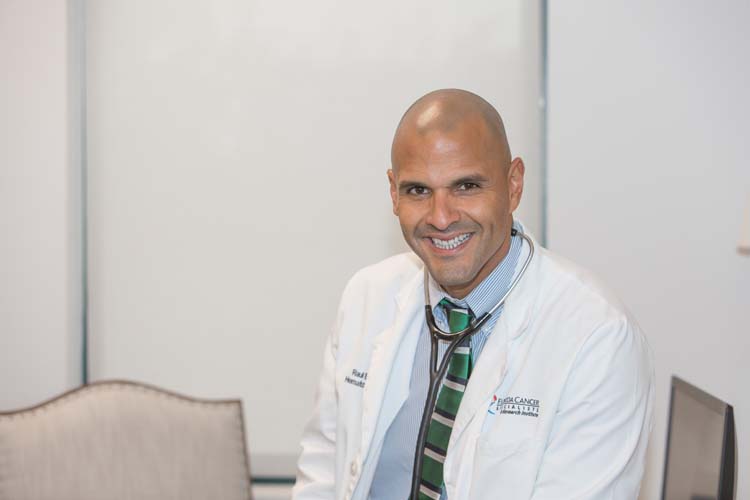
Recent research from a United Kingdom-funded clinical trial could change the standard of care for men with prostate cancer.
Each year, more than 180,000 American men are diagnosed with prostate cancer. Other than skin cancer, it is the most common cancer affecting men, occurring primarily in men aged 65 or older.
Currently, the preferred initial treatment for prostate is hormone therapy. The clinical trial, called STAMPEDE, studied the results of adding a drug called abiraterone (brand name Zytiga) to hormone therapy and found that, by doing so, significantly increased the three-year survival rate from 76 percent to 83 percent.
Professor Nicholas James, from the University of Birmingham in the UK, was the chief investigator of the trial. He says, “These are the most powerful results I’ve seen from a prostate cancer trial – it’s a once-in-a-career feeling. This is one of the biggest reductions in death I’ve seen in any clinical trial for adult cancers.”
Dr. Raul Storey, a medical oncologist affiliated with Sebastian River Medical Center, agrees. “This is one of the most important trials in the history of treatment of prostate cancer, and will definitely change the way we treat high risk prostate cancer,” he says.
The trial involved nearly 2,000 men. The results were presented at the annual meeting of the American Society of Clinical Oncology (ASCO) in June, and published in the New England Journal of Medicine.
Prostate cancer cells usually depend on testosterone to grow. Standard hormone therapy – also called androgen deprivation therapy – blocks the action of male sex hormones, halting the disease. Zytiga, another form of hormone therapy, goes further and shuts down the production of the hormones that fuel prostate cancer’s growth.
Zytiga, a tablet, is usually given to men with prostate cancer that has metastasized (spread) and has stopped responding to standard to hormone therapy, but the results from the STAMPEDE trial indicate its benefit for men just beginning treatment.
Dr. Storey notes, “Zytiga also lowered the chance of treatment failure – measured by worsening symptoms or poor test results – by 71 percent compared with standard therapy.” In addition, the study found that the addition of Zytiga to standard hormone therapy reduced the incidence of severe bone complications (a major problem in prostate cancer) by more than 50 percent.
The risk factors for prostate cancer include age (it rarely occurs in men under 40 and about 60 percent of cases are in men over age 65); race (for reasons that are not understood, it is more common in African American men than in men of other races); and a family history of the disease.
Several inherited gene changes seem to raise the risk of prostate cancer, but experts believe they account for only a small percentage of overall cases. The following information is courtesy of the American Cancer Society:
- Inherited mutations of the BRCA1 or BRCA2 genes raise the risk of breast and ovarian cancers in some families. Mutations in these genes (especially in BRCA2) may also increase prostate cancer risk in some men.
- Men with Lynch syndrome (also known as hereditary non-polyposis colorectal cancer, or HNPCC), a condition caused by inherited gene changes, have an increased risk for a number of cancers, including prostate cancer.
The American Cancer Society recommends that men in the following circumstances have a discussion with their doctor about screening for prostate cancer:
- At age 50 for men who are at average risk of prostate cancer and are expected to live at least 10 more years.
- At age 45 for men at high risk of developing prostate cancer. This includes African Americans and men who have a first-degree relative (father, brother, or son) diagnosed with prostate cancer at an early age (younger than age 65).
- At age 40 for men at even higher risk (those with more than one first-degree relative who had prostate cancer at an early age).
Testing consists of a prostate-specific antigen (PSA) blood test, and (perhaps) a digital rectal exam.
In addition to hormone therapy, treatment options for men with prostate cancer include active surveillance (“watchful waiting”), surgery, radiation therapy, cryotherapy (the use of very cold temperatures to freeze and kill prostate cancer cells), chemotherapy, and vaccine treatment. The chosen therapy is determined based on the man’s individual circumstances and the stage of the cancer.
Dr. Storey’s private practice is part of Florida Cancer Specialists, with locations at 3730 7th Terrace Suite 101 in Vero Beach, 772-589 0879, and 13060 U.S. 1, Suite A, in Sebastian, 772-228 3381.



